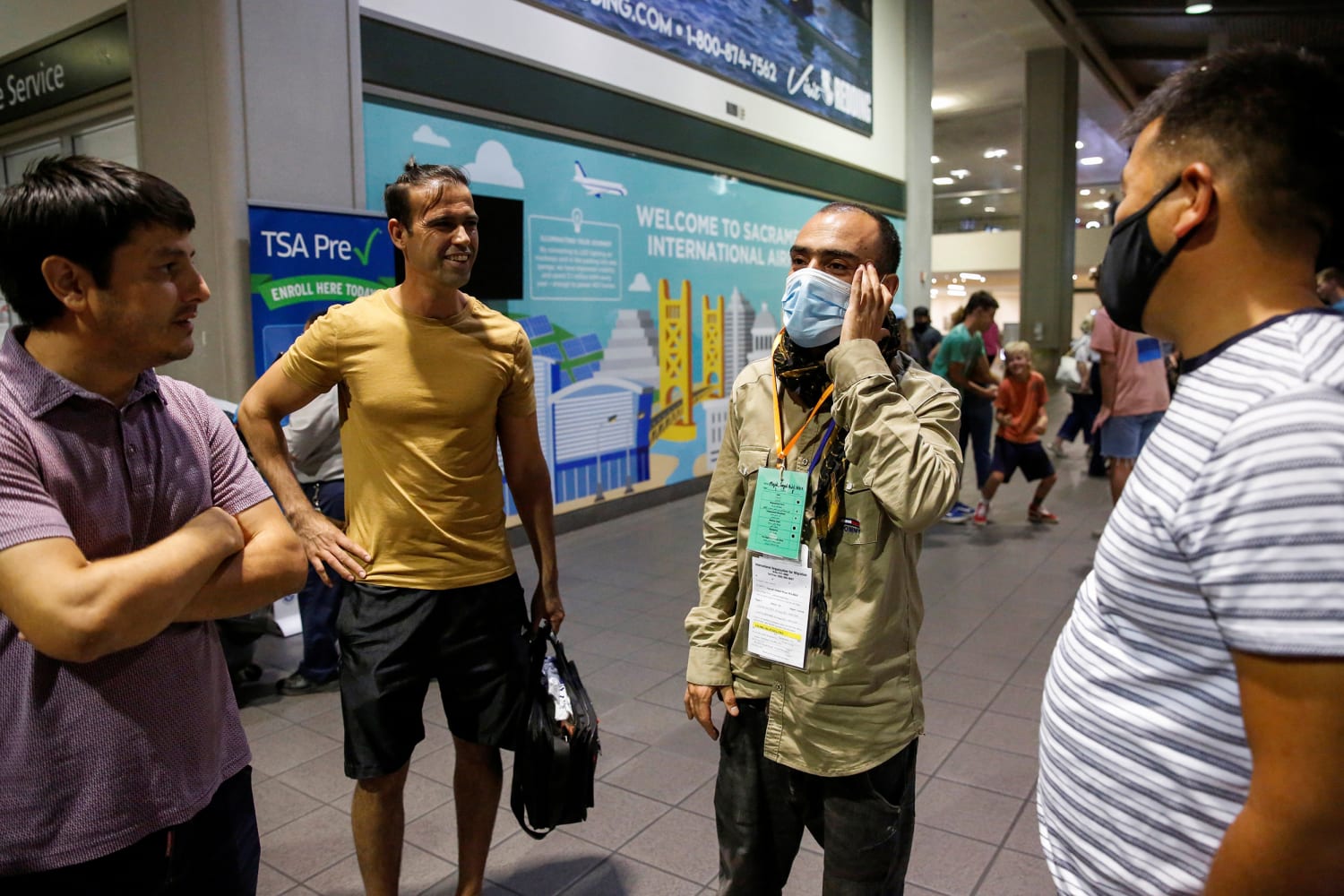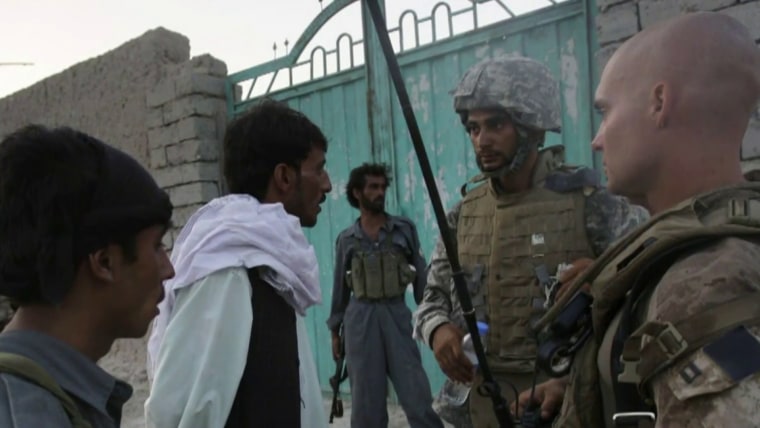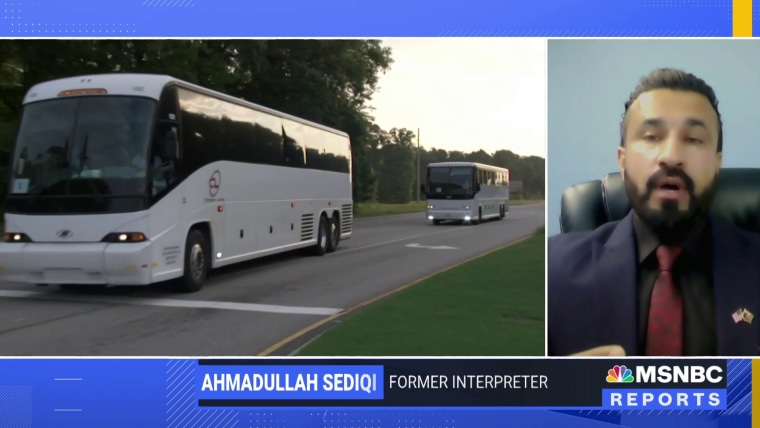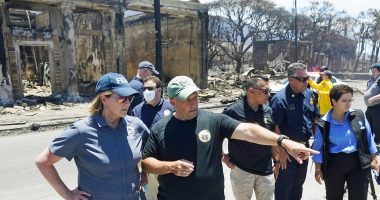WASHINGTON — A planned U.S. evacuation of a small group of Afghan interpreters will likely drag on even after the last American troops withdraw from the country by the end of August, according to numbers provided by the Biden administration — and some may have to wait more than two years to get out.
So far, the administration has evacuated less than one percent of the more than 80,000 Afghans who have sought U.S. visas under the Special Immigrant Visa program designed to help former interpreters who worked with U.S. troops and who now face the threat of retribution from the Taliban.
President Joe Biden ordered U.S. troops out of Afghanistan by Aug. 31, and his administration has said it plans to evacuate about 750 Afghans who worked for the U.S. government in Afghanistan — along with their families — directly to U.S. soil, and fly out another 4,000 Afghans and their families to third countries. The administration has yet to announce which third countries will host the evacuees or when those flights will take place.
Over the past week, the Biden administration has overseen three flights of Afghan evacuees and their families to the United States, for a total of about 700 people. At the current pace, it would take about two months to fly out the initial group designated for evacuation, even though U.S. troops depart on Aug. 31.
The plight of thousands of other Afghans who worked for U.S. troops or diplomats is even more uncertain and it’s not clear if the administration will opt to fly them out. At the current tempo of 700 evacuees a week, it would take more than two years to fly out the roughly 20,000 Afghans who are in the SIV pipeline along with their families.
Meanwhile, the Taliban is on the march, advancing on major cities and setting off panic among Afghan civilians.
Taliban forces seized control of the capital of Nimroz Province in southwestern Afghanistan on Friday, the first provincial capital to fall to the militants since U.S. troops began withdrawing from the country.
Amb. Tracey Jacobson, who is overseeing the U.S. evacuation effort, has said her team will continue to work to resettle Afghans even after the departure of American troops.
“We’re going to continue to work on this. We will continue to relocate eligible SIV applicants and their families who have our gratitude for their service,” the former ambassador to Turkmenistan, Tajikistan and Kosovo told reporters last week. “We absolutely intend to continue this program after the pullout of troops.”
A State Department spokesperson said that “due to operational security, we are unable to discuss flight schedules.”
On Friday, 16 veterans organizations representing more than three million members, including the Veterans of Foreign Wars and the Wounded Warrior Project, appealed to President Biden to speed up and expand the evacuation of Afghans who have sought entry to the U.S. under the Special Immigrant Visa program. The visa category was created more than a decade ago to help those who worked for the U.S. military in Iraq or Afghanistan.
“We must immediately evacuate all those who fought alongside us and have requested our help. As veterans, we believe we owe these Afghans a debt of honor; as our armed forces withdraw from Afghanistan, we must honor that debt,” the groups wrote in a letter to the White House.
“Around the globe, American military efforts have only been possible because of the assistance of local allies like those in Afghanistan. Future potential allies will study how we treat these Afghans when choosing whether to partner with us,” the letter said.
Two State Department officials told NBC News that a push from the Department of Homeland Security to have Afghan evacuees undergo additional medical screening before they board evacuation flights has slowed down the process. The officials also said cutbacks under the Trump administration had left government agencies and nongovernmental organizations handling refugee resettlement understaffed and ill-prepared for the arrival of the Afghans.
The State Department spokesperson did not directly address the role of DHS officials in the evacuation effort. But the spokesperson said applicants coming to the U.S. are required by law and regulations “to complete an intensive, multi-agency security screening process and undergo additional medical screening before receiving their special immigrant visa and resettling in the United States.”
The task force overseeing the evacuations, said the spokesperson, is working “to improve, strengthen and streamline the process.”
The spokesperson also said that a State Department review of the refugee admissions program “revealed that it will take some time to build back, however, the rebuilding process is happening and will enable us to support much increased admissions numbers in future years.”
DHS did not immediately respond to a request for comment.
An Afghan who worked with the U.S. government published a commentary this week along with his U.S. lawyer, Julie Kornfeld, on the website Just Security. He described the terror his family has faced and the anxiety of waiting for a U.S. visa.
The Afghan, who published under the pseudonym Khan to protect his safety, wrote that his family had received death threats from the Taliban because of his work and that the militants recently attached a live hand grenade to his front door. He recounted how he managed to smuggle his family to Kabul in an ambulance, bypassing Taliban checkpoints.
He pleaded for the Biden administration to expedite the evacuations.
“Each day longer we have to wait, we are more at risk of being attacked and killed,” he wrote. “The administration must act immediately to prevent the murder of the thousands of people like me who face death because of our aid to U.S. forces.”
Source: | This article originally belongs to Nbcnews.com













